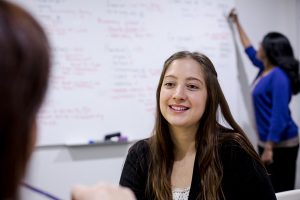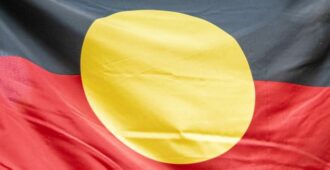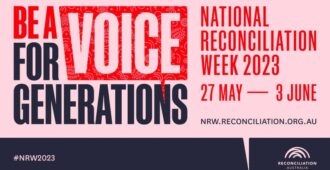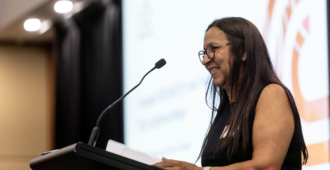

What makes Study of Environment on Aboriginal Resilience and Child Health (SEARCH) unique is that it is an active partnership between Aboriginal communities and researchers, where decisions, knowledge and skills are shared, says SEARCH Project Officer and Wotjobaluk woman Simone Sherriff.
Ever since I was a kid in Wagga Wagga I’ve been interested in research. Aboriginal health has always been the area I wanted to get involved in, because there is a real need to understand what contributes to the large health gap between Aboriginal and non-Aboriginal people.
But I believe it is important that Aboriginal communities are involved in that research right from the beginning − not at the end when it is too late for the community to have a voice. The Lowitja Conference Statement recently highlighted the importance of investing in Indigenous-led research. I too feel it is vital for Aboriginal researchers to be equal partners in research into the issues facing our communities and not just the window dressing on an ethics application. That’s why I’m proud to have spent the past six years working on one of Australia’s most innovative and collaborative research partnerships − SEARCH, which has just been refunded by the NHMRC.
An active partnership
The Study of Environment on Aboriginal Resilience and Child Health (SEARCH) is the largest ongoing study of urban Aboriginal children ever conducted, with 1600 children and their families across NSW taking part. While there is a large body of research focused on the health of Aboriginal people in rural and remote communities, there is significantly less research focused on the health of the many Aboriginal people living in urban and large regional centres – in NSW around 75% of Aboriginal people live in these areas. This is one of the main reasons the SEARCH study was established.
SEARCH is an active partnership between four Aboriginal Community Controlled Health Services (ACCHSs), leading researchers, the Aboriginal Health and Medical Research Council (AH&MRC) and the Sax Institute, where the health services set the research priorities and guide how data is collected, interpreted and used. Partnership is the key word here.
The Study is founded on the principle that Aboriginal communities should be partners and leaders in research in order to achieve the best outcomes. The ACCHSs involved in the program have identified the priority health areas they want more information on. At the outset, they said they wanted a long-term study that followed the children and their families over time. Family and the environment are so important to our mob, so it was vital to include these areas in the research to be able to get a clear picture on the health of our kids and what factors have an impact on their health trajectories. The end result saw an agreement to focus on a number of key areas: hearing, speech and language development; social and emotional wellbeing; cardiovascular, kidney and metabolic disease; and, health risk behaviours.
My role involves working with the participating ACCHSs to coordinate data collection for the study. This involves training the Aboriginal Research Officers in data collection methods and regularly meeting with them to provide support. It’s really rewarding work.
Research in action
SEARCH is also different because it does a lot more than collect data and identify problems for publication in the scientific literature. Our focus is on using these findings to develop programs that address the issues identified and to give the data back to the community in a way they can use this in their work.
At the local level, ACCHSs have first-hand knowledge about the health issues facing the kids and families in their communities, but they have lacked the data to back it up. SEARCH is giving these health services evidence that they can take to funding and government bodies to show the real need for further support and funding.
For example, our research helped to identify the scale of the problem with middle ear disease among the children participating in SEARCH. Left untreated, middle ear disease can have a devastating impact on kids’ hearing, speech and language development. After identifying the children in need of hearing and speech services, SEARCH led to a program called HEALS, (the Hearing, EAr health and speech and Language Services project) which has now provided ENT operations and/or speech and language services to more than 800 kids in NSW and has helped to clear waiting lists for treatment.
A two-way street
We also place a real focus on knowledge exchange sessions so that we can feed the data back to communities and to learn from each other. It’s great to be able to see our mob sharing their knowledge and skills with non-Aboriginal researchers and learning skills from them as well.
An important part of SEARCH is the commitment to promoting the Indigenous research leaders of the future, and supporting Aboriginal research officers at each ACCHS and Aboriginal staff in the coordinating centre at the Sax Institute.
Over the years, SEARCH has developed a rich dataset with loads of information on a broad range of health topics. The partnership is working with experts including paediatricians, speech pathologists, Aboriginal health workers, audiologists, ear, nose and throat specialists and epidemiologists, among others. There are also many ACCHS employees with expertise in different areas, such as data collection, interpreting findings, writing up findings and conference presentations. This is what makes SEARCH such a great model. We are all aiming for the same goal of improving the health and wellbeing of urban Aboriginal families.
My future
My long term career goal is to gain more experience and skills in research by completing a PhD. I’d then like to work with ACCHS to assist them in conducting their own research and to use the findings to compete for grants and funding for more programs and services.
I would also love to be able to get more of our mob interested and involved in good research. It is important that there is more effort put into encouraging more Aboriginal people to become researchers in Australia and in building up the skills of local community members so there can be more research conducted in a way that is appropriate and sensitive to the community.
I believe the SEARCH model is an example of the way ahead – I am hopeful that we are progressing and moving forward.
Find out more
- Read more about the NHMRC funding boost for largest ongoing study of urban Aboriginal child health
- Read How the SEARCH partnership research is improving ear health for urban Aboriginal kids
- Find out more about SEARCH




